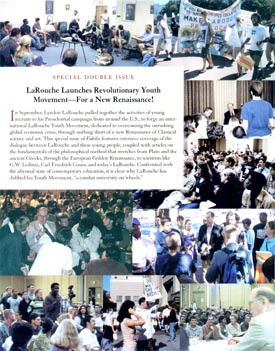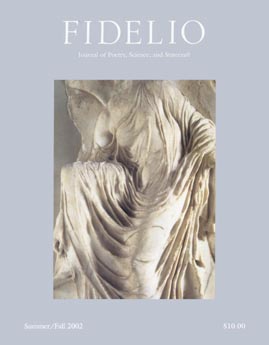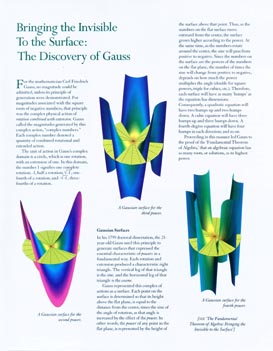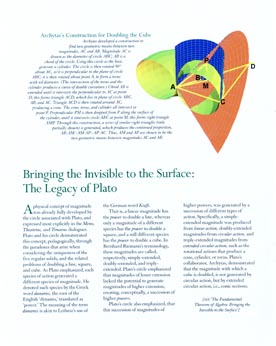
Home | Search | About | Fidelio | Economy | Strategy | Justice | Conferences | Join
Highlights | Calendar | Music | Books | Concerts | Links | Education | Health
What's New | LaRouche | Spanish Pages | Poetry | Maps
Dialogue of Cultures
FIDELIO
Journal of Poetry, Science, and Statecraft
Summer/Fall, Vol XI, No.3-4
PDF Archive
full issue, plus PDFs of each article


FRONT COVER
BACK COVER
"The LaRouche Youth Movement"


"Bringing the Invisible to the Surface: The Legacy of Plato
"Bringing the Invisible To the Surface: The Discovery of Gauss"
FIDELIO
Table of Contents
“It is through beauty that one proceeds to freedom.”
—Friedrich Schiller
Summer/Fall 2002
SPECIAL DOUBLE ISSUE
|
4
How To Turn a Dark Age Into a New Renaissance Gabriele Liebig 17 The Fundamental Theorum of Algebra: Bringing the Invisible to the Surface Bruce Director Afterward by Lyndon H. LaRouche, Jr. |
|||||||||
| Editorial Translation News Obituary Commentary Art Books |
2 49 91 93 97 98 100 102 105 110 111 112 114 |
Lyndon LaRouche's International Youth Movement Wilhelm von Humboldt: On the Greek Model D.C. Meet: ‘The Courage To Lead in a Time of Crisis’ Italian Parliament Spurs New Bretton Woods LaRouche Keynotes Conference on China ‘Boynton Weekend’ Honors Heroes of Selma William Warfield Beware of the Athenians, Mr. Bush! Leonardo da Vinci: Painter of Movement LaRouche's Emergency Infrastructure Program Nothing Like It in the World Supreme Command Festschrift for Lyndon LaRouche |
|||||||
Order This Issue or Subscribe!
New Fidelio Issued For University in Motion
As LaRouche says in response to a question on education: "We, and our young people, must become, in effect, a university.... We can create a better university than exists in the United States generally today: We're acting in politics, in history, in music, other parts of art. We're attacking the hard core of physical science, and science and mathematics from the standpoint of physical science.
"What I've been doing, with others, is to reduce the core curriculum at the upper secondary, and undergraduate level, to a few essential number of issues, in the development of modern European physical science, and mathematics, based on the precedent of Classical Greek mathematics and science, from Archytas and Plato, through Eratosthenes and Archimedes. Because, what happened in the 15th-century Golden Renaissance, was the rebirth, in a significant scale, of knowledge that had been lost since about 200 B.C., with the rise of Rome, of Classical Greek culture. And much of the rudiments of modern scientific knowledge, are based on these Classical Greek studies....
"If you understand the fundamental principles, you will not know everything, but you will know how to know, and the basic thing of education is not to teach people what to think, but to teach them how to know. And, therefore, we should think of young people today—and we should try to inspire this as well as doing it,—is to create a university in motion, of young people who come from the 'no-future generation,' who are seizing the future, and seizing the qualifications to conduct it."
- Classical Curriculum -
The magazine's regular features present aspects of the Classical curriculum needed to arm and inspire this "university in motion."
* "How To Turn a Dark Age into a New Renaissance": Gabriele Liebig reviews the historical precedents of crucial individuals who, like LaRouche today, provided the ideas needed to rescue civilization from collapse—from the Classical Greeks, through the founding of Christianity, to the Golden Renaissance. Liebig concludes with an ecumenical dialogue taken from the writings of Nicholas of Cusa, Ibn Sina (Avicenna), G.W. Leibniz, and Lyndon LaRouche.
* "Bringing the Invisible to the Surface": Bruce Director explores the method of C.F. Gauss in proving the Fundamental Theorem of Algebra, through the development of the complex number domain—a development based upon the rejection of the formalist mathematics of sense-perception, in favor of the Platonic tradition of physical geometry.
* "Homer, The Blind Seer": Rosa Tennenbaum demonstrates the Homeric revolution of individual self-consciousness and mutual humanity in the Iliad's Achilles, Hector, and Priam, a revolution that underlies the birth of European civilization. In the Appendix, recent archaeological discoveries at the site of ancient Troy pose the question of "Hypothesis and the Science of History."
*: An original translation of Wilhelm von Humboldt's essay on the Greek Ideal shows how the renaissance of Germany's Weimar Classic reached back—once again—to the Golden Age of Greece.
* "Leonardo da Vinci: Painter of Movement": Through works by Leonardo and others, Karel Vereycken demonstrates how great art illustrates the motion of the mind (soul), and not mere externalities. As in the physical sciences, so too in the arts, "the invisible" must be brought to the surface.
schiller@schillerinstitute.org
The Schiller Institute
PO BOX 20244
Washington, DC 20041-0244
703-297-8368
Thank you for supporting the Schiller Institute. Your membership and contributions enable us to publish FIDELIO Magazine, and to sponsor concerts, conferences, and other activities which represent critical interventions into the policy making and cultural life of the nation and the world.
Contributions and memberships are not tax-deductible.
VISIT THESE OTHER PAGES:
Home | Search | About | Fidelio | Economy | Strategy | Justice | Conferences | Join
Highlights | Calendar | Music | Books | Concerts | Links | Education | Health
What's New | LaRouche | Spanish Pages | Poetry | Maps
Dialogue of Cultures
© Copyright Schiller Institute, Inc. 2002. All Rights Reserved.